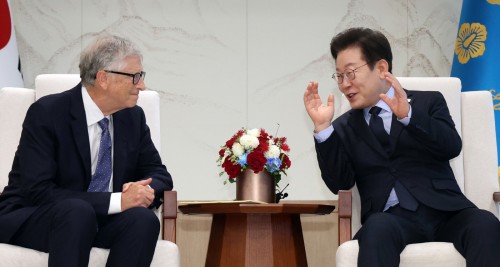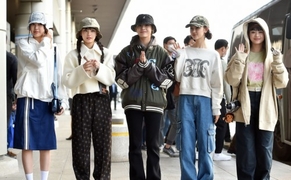 |
| President Lee Jae-myung speaks with Bill Gates, co-chair of the Gates Foundation, during a meeting at the presidential office in Yongsan, Seoul, on August 21. / Source: Yonhap News |
Bill Gates, co-chair of the Gates Foundation, stressed the importance of official development assistance (ODA) during his visit to Seoul on Thursday, calling on South Korea to expand its role in global health and development.
At a press conference in Seoul, Gates noted that Korea’s ODA budget currently stands at about 0.3% of GDP and should be raised toward the international target of 0.7%. “ODA has been sustained, but there are challenges depending on circumstances,” he said, urging Seoul to step up its contributions.
He suggested two ways to strengthen Korea’s partnership with the foundation. First, he highlighted the rapid growth of Korea’s bioscience industry and its expanding role in global health. He recalled early funding support for the International Vaccine Institute (IVI) and collaborations with Korean firms such as SK Bioscience and LG Vaccine, which led to breakthroughs like the cholera vaccine. “Korea has made remarkable progress through these partnerships,” Gates said, also citing joint projects with Samsung.
Gates praised Korea as a model case of transforming from an aid recipient into a donor country. “There is a need to expand ODA from the current 0.3% of GDP. Even if it doesn’t immediately reach the advanced economy average of 0.7%, greater investment in multilateral institutions can deliver powerful results,” he explained, adding that Seoul should ultimately aim for 0.7% or higher. He projected that Korea could realistically achieve 0.5% within five years.
He emphasized that increasing ODA is not only a moral responsibility but also an investment in Korea’s own safety and prosperity. Addressing concerns about the Trump administration’s cuts to global health budgets, Gates responded, “Congress has provided balance, and I do not expect dramatic reductions,” signaling continued U.S. support.
When asked about domestic challenges such as low birthrates and aging, Gates reminded that “Korea itself grew with the help of international aid. Now it is Korea’s responsibility to help others in need.” He pointed to maternal mortality and child health as pressing issues, stressing “humanity” and “solidarity” as guiding principles.
On potential aid to North Korea, Gates said, “North Korea is also a low-income country, so if it seeks cooperation, it can be included. But so far, it has declined engagement.”
He also highlighted artificial intelligence and nuclear energy as future areas of cooperation. In particular, he called AI “good news for low-income countries,” noting that in Africa, many people may never see a doctor in their lifetime. AI-based consultation and diagnostics, he said, could play a vital role in improving health care, alongside applications in drug development and agriculture.
Gates further mentioned TerraPower, his nuclear energy firm, and its partnerships with Korean companies SK and HD Hyundai, emphasizing Korea’s importance in developing small modular reactors and other clean energy solutions. “Korea has gone from a war-torn aid recipient to a country of economic and democratic achievement,” Gates said. “It now stands proudly as a provider of vaccines and diagnostic technologies to vulnerable nations.”
Most Read
-
1
-
2
-
3
-
4
-
5
-
6
-
7





















